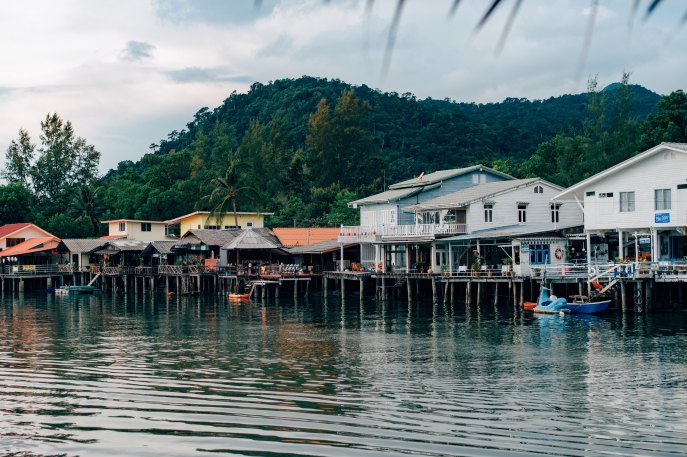Ocean acidification. Coral bleaching. Overfishing. Marine Pollution and debris. Invasive Species. Dead zones. The challenges our oceans face can seem grim on the best of days. But humankind has the ingenuity and optimism to solve them.
When we combine the knowledge of conservationists and biologists with engineers, programmers, makers, and designers, we can improve the efficacy, speed, cost, scale and sustainability of conservation efforts through novel technologies and approaches. A diverse range of skills and professions must be brought to the table to collaboratively address these challenges. This is the idea behind Make for the Planet.

Marine scientists, our oceans, and the people who rely on the oceans are facing turbulent times. What can you do to get involved and change the field of marine conservation? (© Conservation X Labs)
Make for the Planet Borneo 2018
Join Make for the Planet Borneo! Make for the Planet is an exciting, fast-paced, collaborative, and hands-on invention competition for multidisciplinary teams to build software and/or hardware solutions in response to specific marine conservation challenges.
Conservation X Labs will host up to 15 teams (60 people maximum) from around the world to compete in Make for the Planet Borneo. This event will take place on June 24-29 at the 5th International Marine Conservation Congress in the Waterfront Hotel in Kuching, Malaysia.
Make for the Planet Borneo will engage students and practitioners from multiple fields – engineering, design, do-it-yourself making, computer programming, science and technology, etc. – to create solutions for five specific marine conservation challenges to be presented at IMCC5. Teams will have access to a pop-up makerspace with prototyping equipment, including 3D printers and electronics stations, and access to the IMCC5 presentations. Mentors from the IMCC5 delegation and local organizations will be on-hand to help guide the multidisciplinary teams.
During the event, teams will build physical and/or digital representations of their solutions for review by judges. There are prizes & benefits for participating:
- Lodging (June 24-29) and IMCC5 registration is covered for the participating teams.
- At least two teams will win cash prizes, with a prize purse of up to $10,000 USD.
- All participating teams will receive at least one consulting session from Shenzhen Open Innovation Lab (SZOIL) to continue to refine their prototypes and solutions after Make for the Planet.
- One team will receive a 6-month hot bench membership to Maker Bay in Hong Kong.
- Deadline for submissions is May 13th, the same day as early-bird registration closes!
Get Involved!
Conservation X Labs is recruiting teams, mentors, and supporters to participate in Make for the Planet Borneo and chart the future of marine conservation. We encourage anyone interested to get involved, especially IMCC5 delegates, and participate in this exciting and promising competition.
Form a team & apply
We are looking for diverse teams of up to 4 people each to participate in designing, developing and prototyping solutions to marine-related conservation challenges. Teams can be composed of students or non-students and can have a wide variety of backgrounds and areas of expertise. We will accept up to 15 teams of 4. As a participant on a team, you get to have fun and build an early-stage model of a real-world solution while interacting with your potential customers who are on-site as reviewers, mentors, and conference-goers.
The participant application is open until we reach capacity – visit the website HERE. Attending IMCC5 and want to participate on a team, or still looking for team mates? You can apply! Read more about the event including logistical information and a previous Make for the Planet in 2017.
Mentors and Reviewers
We are looking for individuals with subject matter expertise in marine related areas, as well as those who have experience in engineering, data science, open innovation and large scale problem solving. As a Mentor or Reviewer, you can apply your expertise to inspire, guide, and incentivize the innovative teams creating real-world solutions. The teams might just create the thing that you need to help solve your conservation problem! We welcome an unlimited number of Mentors, so please sign-up HERE if you are interested. Conservation X labs will recruit about 7 Reviewers who will hear the pitches from all participating teams and identify finalists.
IMCC5 delegates are invited to mentor teams at Make for the Planet Borneo – sign up HERE.

Can your innovative idea help to preserve our oceans and the people reliant on them? Apply for Make for the Planet Borneo to put your idea out there! (© Conservation X Labs)
Spread the word, be a sponsor, or be a partner
Are you reading this blog? Help us get the word out about the event to a broad network of innovators and potential participants. Share this story on social media & #Make4thePlanet #IMCC5 and @conservationx @IMCC2018
Interested in sponsoring or partnering with Make for the Planet Borneo? Contact barbara@conservationxlabs.org

